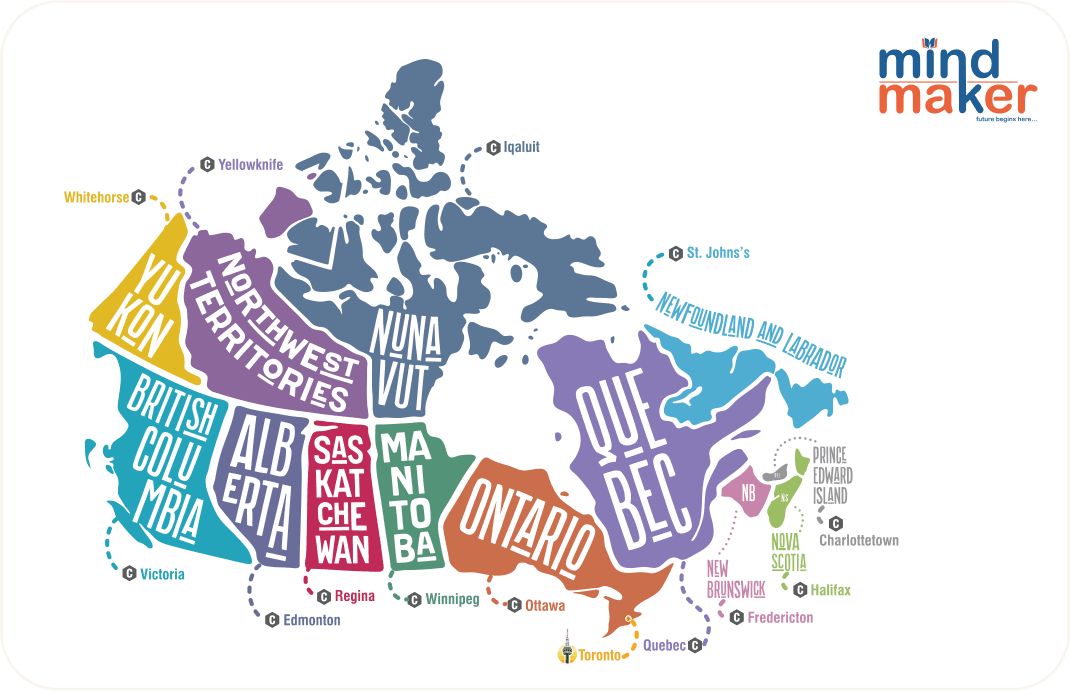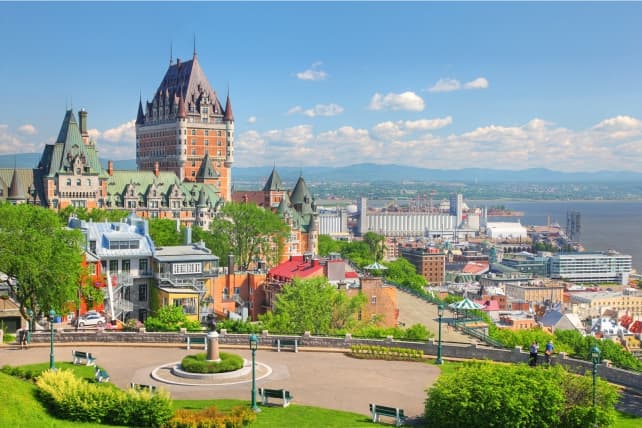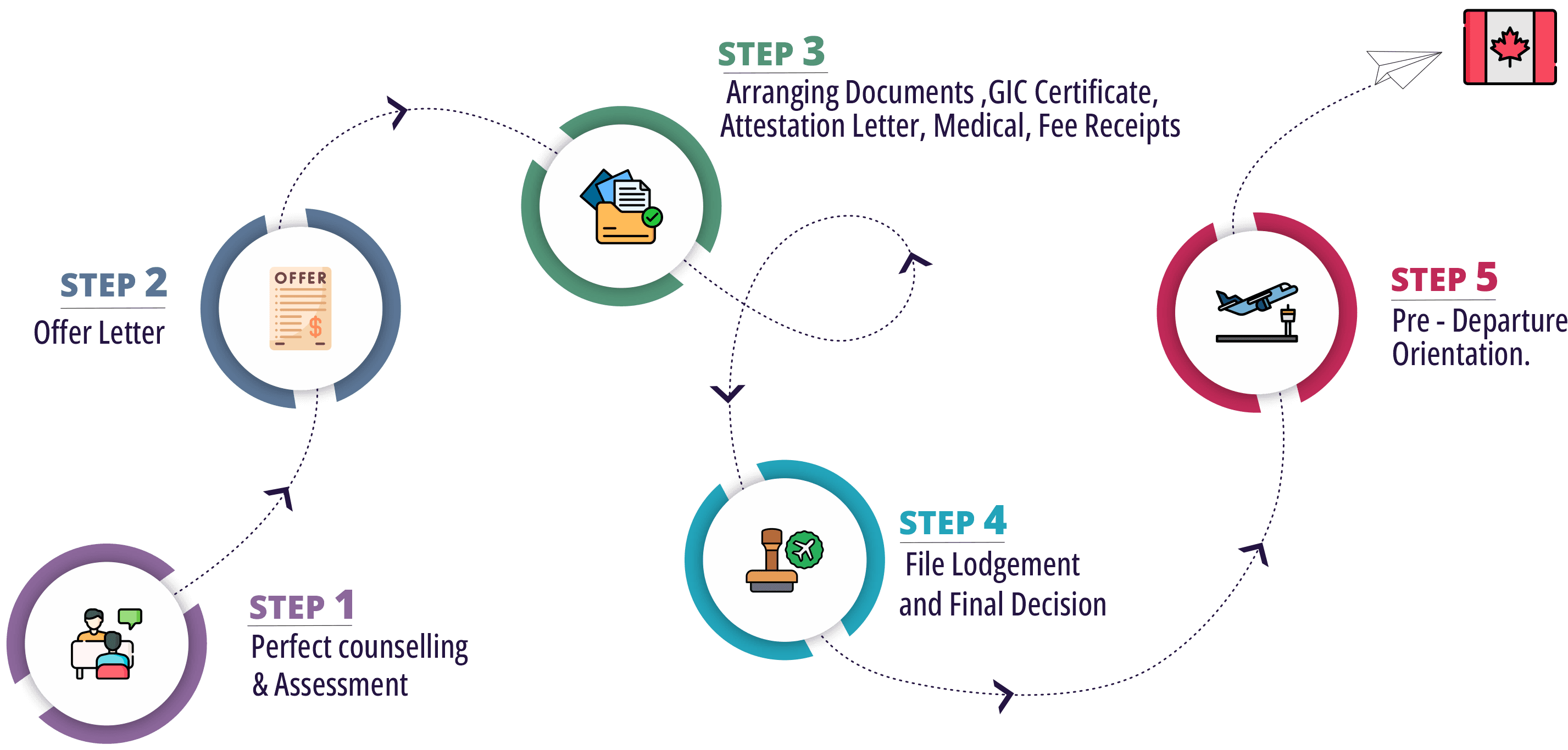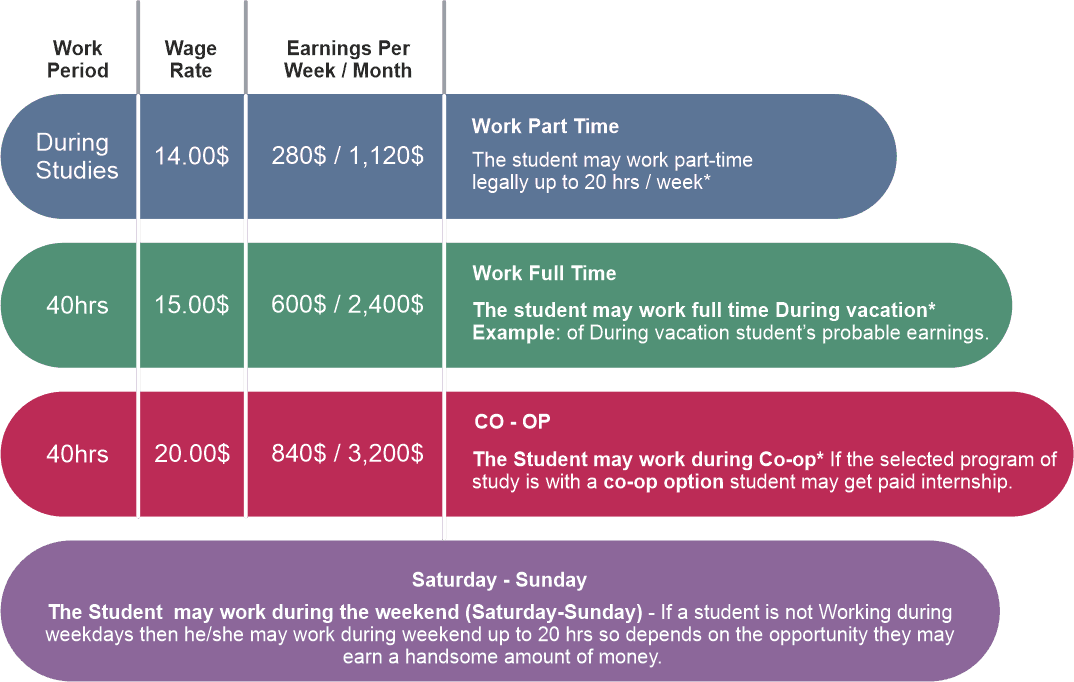canada
Get expert guidance for studying in Canada, from program selection to visa application, ensuring seamless support tailored to your needs.
Studying in Canada is a gateway to unparalleled academic excellence and a rich multicultural experience. Canadian universities and colleges uphold exemplary academic standards and stringent quality controls, making degrees from Canadian institutions globally recognized and esteemed. With a diverse array of programs spanning STEM fields, humanities, business, arts, and more, Canadian institutions cater to diverse interests and career aspirations. Moreover, Canada's cutting-edge research facilities and initiatives across various fields provide students with opportunities to engage in research projects and contribute to advancements in their chosen disciplines. Embracing people from all corners of the globe, Canada's multicultural environment nurtures cross-cultural understanding and enriches the overall educational experience. Combined with Canada consistently ranking among the world's safest countries, with inclusive policies ensuring that international students feel welcomed and supported throughout their stay, studying in Canada offers a unique blend of academic rigour and cultural immersion.
Beyond academic pursuits, studying in Canada opens doors to promising career opportunities and a high quality of life. International students often have access to part-time work opportunities during their studies and full-time employment during breaks, aiding in covering living expenses and gaining valuable work experience. Moreover, Canada offers various pathways for international students to transition to permanent residency post-graduation, including the Post-Graduation Work Permit Program (PGWP) and provincial nomination programs. Canada's breathtaking natural landscapes and vibrant urban centers provide a diverse range of experiences beyond the classroom, catering to outdoor enthusiasts and urban explorers alike. While tuition fees vary depending on the institution and program, Canadian education is generally more affordable compared to other popular study destinations, with scholarships and financial aid options available for eligible students. Combined with Canada's high quality of life, characterized by excellent healthcare, social services, and a high standard of living, studying in Canada offers a unique opportunity for personal growth, career advancement, and overall student satisfaction.
Canada Map : Provinces and Capitals

Benefits
Streamlined Visa Process
:Through the Student Direct Stream (SDS), the visa application procedure for students is expedited, ensuring efficiency and promptness.
Exceptional Education
:Canada provides outstanding educational opportunities at reasonable costs, along with numerous scholarships accessible to students.
Plentiful Employment Options
:The Canadian job market offers a broad spectrum of career prospects, catering to both locals and immigrants, and ensuring competitive remuneration.
Internationally Acclaimed Universities
:Canadian universities consistently secure top positions globally, granting access to an extensive research network and promising employment prospects.
Cultural Richness
:Canada's diverse cultural landscape fosters an inclusive and welcoming ambiance, with over 250 ethnic origins and 200 languages spoken across the nation.
Dynamic Campus Life
:Canadian educational institutions host various engaging events year-round, fostering an energetic academic milieu and facilitating networking opportunities.
Migration Pathways
:Post-Graduation Work Permit (PGWP) and Open Work Permit options provide students with valuable work experience and potential avenues for remaining and working in Canada.
Financial Feasibility
:Canada offers comparatively affordable tuition fees compared to counterparts like the US and UK, rendering it an attractive choice for many prospective students.
Expert Faculty
:Canadian universities are staffed with highly qualified and specialized faculty members, enriching the learning experience for students.
Safe Haven
:Renowned for its safety standards, Canada ensures a tranquil and secure environment, promoting peace of mind for students.
Investment in Education
:Canada dedicates a significant portion of its GDP towards education, underscoring its commitment to delivering top-tier educational opportunities.
Post-Education Prospects
:Graduates can avail themselves of paid internships and a post-study work visa for up to three years, augmenting their career prospects significantly.
Various Field of Study
Canada is renowned globally for its outstanding education system, offering a diverse range of programs spanning undergraduate, graduate, and post-graduate levels. Canadian universities also offer certificate and diploma courses. Undergraduate students have the choice between Bachelor's or Associate's degrees, typically requiring 3 to 4 years for completion. Graduate-level studies include Master's and Doctoral programs, which can extend from 2 to 6 years, while post-graduate diploma courses generally last 1 to 2 years. These programs emphasize experiential learning, enabling students to apply theoretical knowledge in practical contexts, acquire hands-on skills, and cultivate valuable academic expertise in their respective fields.
| Qualifications | Duration |
|---|---|
| Post-doctoral Program | Varies with no specified limit |
| Doctorate or Ph.D | 4 to 7 years |
| Master's Degree | 2 to 3 years |
| Post-Graduate Diploma/Certificate | 1 to 2 years |
| Bachelor's Degree | 3 years |
| Advanced Diploma | 2 to 3 years |
| Diploma | 1 to 2 years |
| Certificate | Typically lasts for one year |
Top Field of Study
Business and Management
:Includes programs in business administration, finance, marketing, management, entrepreneurship, and international business.
Engineering
:Offers programs in civil engineering, mechanical engineering, electrical engineering, computer engineering, chemical engineering, and environmental engineering.
Computer Science and Information Technology
:Provides courses in computer science, software engineering, data science, artificial intelligence, cybersecurity, and information systems.
Health Sciences and Medicine
:Includes programs in medicine, nursing, pharmacy, public health, dentistry, physiotherapy, occupational therapy, and medical research.
Biotechnology and Life Sciences
:Offers courses in biotechnology, biochemistry, genetics, microbiology, molecular biology, pharmaceutical sciences, and biomedical engineering.
Social Sciences and Humanities
:Encompasses fields such as psychology, sociology, anthropology, political science, international relations, economics, history, geography, and linguistics.
Creative Arts and Design
:Provides programs in fine arts, graphic design, digital media, animation, film production, photography, fashion design, and interior design.
Environmental Studies and Sustainability
:Offers courses in environmental science, sustainability studies, ecology, conservation biology, natural resource management, and environmental policy.
Education and Teaching
:Includes programs in education, early childhood education, special education, curriculum development, educational leadership, and adult education.
Agriculture and Agribusiness
:Encompasses fields such as agricultural science, agronomy, horticulture, animal science, food science, agribusiness management, and agricultural economics.
Hospitality and Tourism Management
:Provides courses in hotel management, tourism management, event management, hospitality marketing, culinary arts, and hospitality operations.
Law and Legal Studies
:Offers programs in law, legal studies, international law, criminal justice, human rights law, business law, and intellectual property law.
Physical Sciences and Mathematics
:Encompasses fields such as physics, chemistry, mathematics, astronomy, geology, geophysics, and atmospheric science.
Communication and Media Studies
:Includes programs in journalism, mass communication, public relations, advertising, digital media, broadcasting, and media production.
Language and Literature
:Provides courses in English literature, comparative literature, linguistics, modern languages, translation studies, and creative writing.
| Qualification | Approximate Equivalent in INR | Average Tuition per year Cost |
|---|---|---|
| Business and Management | ₹13,50,000 - ₹21,60,000 | $25,000 - $40,000 |
| Engineering | ₹13,50,000 - ₹24,30,000 | $25,000 - $45,000 |
| Computer Science and Information Technology | ₹13,50,000 - ₹24,30,000 | $25,000 - $45,000 |
| Health Sciences and Medicine | ₹13,50,000 - ₹27,00,000 | $25,000 - $50,000 |
| Biotechnology and Life Sciences | ₹13,50,000 - ₹24,30,000 | $25,000 - $45,000 |
| Social Sciences and Humanities | ₹10,80,000 - ₹18,90,000 | $20,000 - $35,000 |
| Creative Arts and Design | ₹10,80,000 - ₹18,90,000 | $20,000 - $35,000 |
| Environmental Studies and Sustainability | ₹10,80,000 - ₹21,60,000 | $20,000 - $40,000 |
| Education and Teaching | ₹10,80,000 - ₹18,90,000 | $20,000 - $35,000 |
| Agriculture and Agribusiness | ₹10,80,000 - ₹18,90,000 | $20,000 - $35,000 |
| Hospitality and Tourism Management | ₹10,80,000 - ₹18,90,000 | $20,000 - $35,000 |
| Law and Legal Studies | ₹113,50,000 - ₹21,60,000 | $25,000 - $40,000 |
| Physical Sciences and Mathematics | ₹10,80,000 - ₹21,60,000 | $20,000 - $40,000 |
| Communication and Media Studies | ₹10,80,000 - ₹18,90,000 | $20,000 - $35,000 |
| Language and Literature | ₹10,80,000 - ₹18,90,000 | $20,000 - $35,000 |
In Take
Canada offers three major intakes for international students:
Fall Intake (September)
:This primary intake aligns with the start of the academic year, offering a wide range of undergraduate and graduate programs. It's the most popular intake, providing a smooth transition into university life.
Winter Intake (January)
:Starting in the second semester, this intake allows students to begin their studies in January. While program options may be slightly fewer than in the Fall, it's significant for those who miss the Fall intake or prefer a midyear start.
Spring/Summer Intake (May/June)
:Less common but available at some institutions, this intake offers a limited selection of programs, including shorter-term courses and specialized programs. It provides flexibility for students who wish to start their studies during the spring or summer months.
Popular Cities
For Indian students considering studying in Canada, several cities stand out for their academic excellence, cultural diversity, and quality of life. Here are some of the best places to study in Canada for Indian students:
Toronto
,Ontario
Vancouver
,British Columbia
Montreal
,Quebec
Ottawa
,Ontario
Waterloo
,Ontario
Calgary
,Alberta
Edmonton
,Alberta
Halifax
,Nova Scotia
Victoria
,British Columbia
Quebec City
,Quebec




Step by Step Guidance
Embarking on a journey to study in Canada entails a meticulously planned process with Mind Maker. Our professional counselors provide personalized guidance in selecting the ideal college and course based on your eligibility. From securing the offer letter to arranging essential documents for visa applications, including language proficiency tests and financial statements, every step is meticulously managed. With our assistance, you'll navigate the complexities of opening a GIC account in Nova Scotia and remitting fees seamlessly. We facilitate medical examinations, ensure proper file lodgment, and communicate visa decisions promptly. With your visa endorsed, our pre-departure orientation equips you with invaluable information about transportation, accommodation, and cultural nuances. Trust Mind Maker to streamline your travel arrangements and support your academic journey in Canada.
At Mind Maker, our commitment to your study abroad journey in Canada is unwavering. With a comprehensive approach, we meticulously handle each step to ensure a smooth transition. From the initial counseling sessions where we tailor recommendations to suit your preferences, to the procurement of offer letters and organization of essential documents, our expertise guides you every step of the way. We facilitate the opening of GIC accounts, handle fee remittances, and coordinate medical examinations as per Canadian Government regulations. Our meticulous attention extends to filing visa applications and promptly communicating outcomes. With your visa in hand, our pre-departure orientation provides invaluable insights into Canadian life. Count on Mind Maker to not only assist in travel arrangements but also to support your academic and professional aspirations in Canada and beyond.

Earnings
The average earnings of international students during their studies in Canada can vary widely depending on several factors such as the type of work they do, their field of study, the city they are studying in, and any restrictions imposed by their study permits.
Many international students work part-time during their studies to help cover living expenses. As of my last update, the typical range for part-time work wages in Canada for international students is usually between CAD $10 to CAD $15 per hour. However, this can vary depending on the province and the nature of the job.
International students are allowed to work while studying in Canada, typically up to 20 hours per week during the academic sessions and full-time during scheduled breaks, such as winter and summer holidays.
It's essential for international students to check with their institution and the Canadian government's regulations regarding work permits and restrictions to ensure they are in compliance with the law.

Reviews

I've applied my Canada study visa through Mind Maker Education and I got my visa under 13 days that was amazing and surprising for me and processing my visa through Mind Maker Education was smooth and the staff was helpful. Highly recommended Mind Maker. Thank you Mind Maker Education Team.

Follow us on Favourite
Social Media Platforms
Scan this QR Code
to Explore more